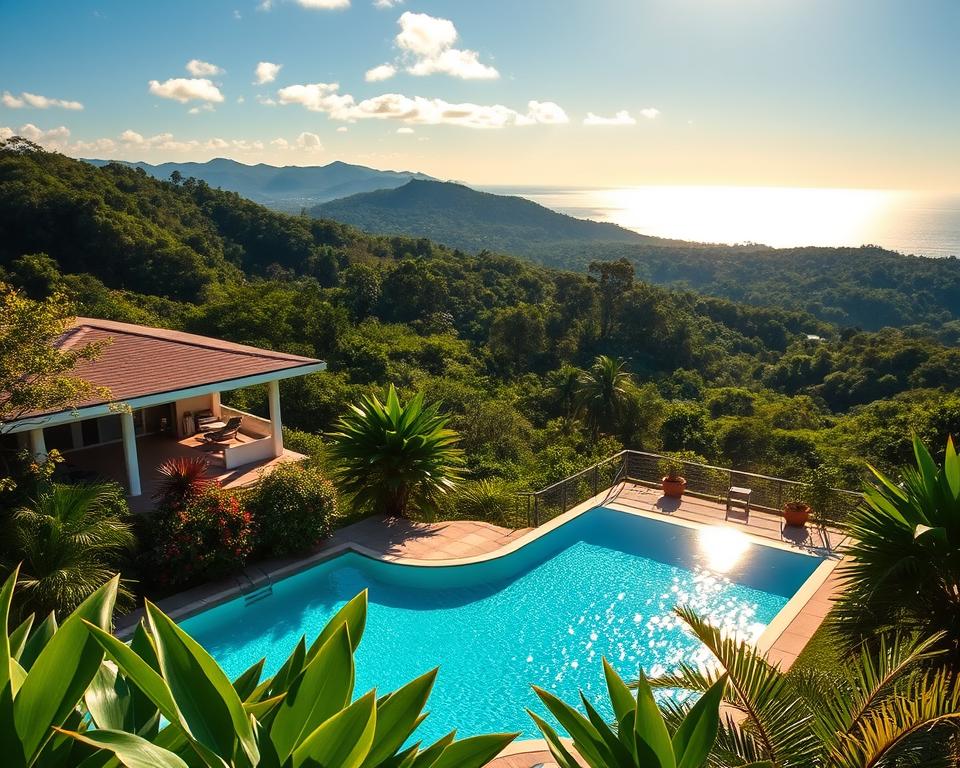Make a Real Estate Purchase Offer in Costa Rica with Experts
At Gap Real Estate, we simplify buying, selling, or investing in Costa Rica. With over two decades of coast-to-coast experience, we deliver seamless transactions through expert guidance, clear communication, and relentless dedication to your goals.
The Costa Rica property market is a magnet for high-value investments, attracting buyers looking for private retreats or development projects. In 2023, European buyers showed increased interest in Costa Rica for retirement, drawn by its tranquility and relative affordability.
Working with experienced real estate professionals is essential for navigating the complexities of the purchase process. Our team at Gap Real Estate brings over 20 years of expertise to help you navigate the Costa Rican real estate landscape with confidence and peace of mind.
Understanding the Costa Rica Real Estate Market
Understanding the nuances of Costa Rica’s real estate market is essential for making informed investment decisions. As we navigate the complexities of this market, it’s crucial to consider various factors that influence property values and investment opportunities.
Foreign Ownership Rights in Costa Rica
Costa Rica welcomes foreign investment, and foreigners have the same property rights as locals. This openness has contributed to the country’s thriving real estate sector. We can confidently invest in Costa Rica’s properties, knowing that our rights are protected.
Current Market Trends and Opportunities
The Costa Rican real estate market has evolved significantly, with a post-pandemic surge followed by a normalization period in 2023. This shift has created favorable conditions for buyers.
Current trends indicate a growing interest in sustainable and eco-friendly properties, reflecting Costa Rica’s commitment to environmental conservation. Regional variations exist, with areas like Guanacaste, Manuel Antonio, and the Central Valley showing different growth patterns. The luxury property segment remains resilient, with continued demand for high-end homes. We can explore various investment opportunities, including residential homes, vacation rentals, and commercial properties.
By understanding local market conditions and price trends, we can make competitive offers that reflect true property values in specific regions. The stabilization of the market has created a more balanced environment for negotiations, allowing us to secure better terms.
Preparing for Your Real Estate Purchase Offer in Costa Rica
When considering a real estate purchase in Costa Rica, preparation is key to making a successful offer. As a buyer, it’s essential to understand the local real estate market and the various factors that influence a transaction.
Finding the Right Location for Your Investment
Choosing the right location is crucial for a successful real estate investment in Costa Rica. The country’s diverse regions offer various lifestyles and investment opportunities, from beachfront properties to mountain retreats.
Setting Your Budget and Financing Options
In the Costa Rican real estate market, buyers can choose between making cash offers or financing offers. Cash offers are often more appealing to sellers as they eliminate the uncertainty of financing, allowing for a quicker and smoother transaction.
Establishing a realistic budget is essential before making a real estate purchase offer in Costa Rica. This includes accounting for the property price, closing costs, potential renovations, and ongoing expenses.
- Financing options in Costa Rica differ significantly from those in North America and Europe.
- Cash purchases are prevalent and often result in stronger negotiating positions.
- Local banks may offer mortgages to foreigners, but with substantial down payments and higher interest rates.
- Some developers and sellers offer owner financing options with more flexible terms.
- International financing through banks in your home country may provide more favorable terms.
- Budget planning should include a buffer for unexpected expenses and currency exchange rate fluctuations.
Working with Experienced Real Estate Professionals
To navigate Costa Rica’s unique real estate landscape, buyers need experts by their side. The process of purchasing property in Costa Rica can be complex, especially for foreign buyers unfamiliar with local laws and regulations.
Selecting a Qualified Real Estate Agent
When searching for “real estate agents in Costa Rica,” it’s essential to find a professional who is knowledgeable about the local market and has experience working with international clients. A qualified agent can guide you through the process, from finding the right property to negotiating the purchase price.
The Importance of a Specialized Attorney
Engaging a specialized real estate attorney is not optional but essential when making a purchase offer in Costa Rica. Your attorney will conduct thorough title searches, verify property boundaries, identify any encumbrances or restrictions, and ensure all documentation meets legal requirements. In Costa Rica, all property transfers must be executed by a Notary Public, who must also be an attorney.
Consider including attorney approval as a contingency in your purchase offer, giving your legal counsel the opportunity to review and approve all terms before the agreement becomes binding. This step is crucial for protecting your interests during the transaction and ensuring a smooth transfer of the property title.
Researching Properties and Determining Your Offer Price
When buying property in Costa Rica, it’s crucial to research thoroughly to determine a fair offer price. This process involves understanding the local real estate market, analyzing comparable properties, and considering various costs associated with the transaction.

Analyzing Comparable Properties
To make an informed offer, we need to analyze comparable properties (comps) that have recently sold in the area. This helps in understanding the market value of the property we’re interested in. By comparing factors like size, location, and amenities, we can determine a fair price range for our offer.
Understanding Property Valuation in Costa Rica
Property valuation in Costa Rica involves assessing the property’s condition, location, and market demand. We should consider getting a professional appraisal to get an accurate valuation. This not only helps in making a realistic offer but also in negotiations with the seller.
Factoring in Closing Costs and Additional Expenses
Closing costs in Costa Rica include a 1.5% transfer tax, legal fees ranging from 1-1.5% of the purchase price, and notary fees approximately between 0.5-0.75%. Additionally, property registration fees, typically around 0.5% of the registered property value, should be factored into our budget. We should also consider costs associated with property inspections, surveys, and potential remediation costs during due diligence.
Annual expenses such as property taxes (approximately 0.25% of the registered value) and homeowners association fees should also be considered in our long-term financial planning. For luxury homes valued above $230,000, an additional annual luxury home tax applies, using a sliding scale based on the property’s value.
Drafting and Submitting Your Purchase Offer
In Costa Rica, the process of making a real estate purchase offer involves several key steps, starting with drafting and submitting an offer. This stage is crucial as it sets the foundation for the entire transaction process.
Essential Elements of a Costa Rican Purchase Offer
A purchase offer in Costa Rica typically includes several essential elements. These are the purchase price, payment terms, contingencies, and closing details. Ensuring that these elements are clearly outlined is vital for a smooth transaction.
The purchase price and payment terms are fundamental components. The offer should specify the amount and how it will be paid, whether through cash, financing, or a combination of both.
The Letter of Intent Process
A Letter of Intent (LOI) is often used as a precursor to the formal purchase offer. It outlines the basic terms of the agreement and demonstrates the buyer’s commitment. While not always legally binding, it serves as a significant step towards finalizing the purchase.
Earnest Money Deposits and Their Significance
An earnest money deposit is a critical component of real estate transactions in Costa Rica, demonstrating the buyer’s serious intent. Typically ranging from 5% to 10% of the purchase price, this deposit is usually held in escrow until the transaction is complete.
- Earnest money deposits demonstrate the buyer’s commitment and secure the property during due diligence.
- The amount can be negotiated, but typically ranges between 5% to 10% of the purchase price.
- Using a reputable escrow service is crucial for protecting the deposit.
By understanding and effectively utilizing these elements, buyers can navigate the Costa Rican real estate market with confidence.
Navigating the Negotiation Process
Successfully navigating the negotiation process is key to securing your desired property in Costa Rica. This process involves several critical steps, from understanding cultural nuances to finalizing the purchase agreement.
Cultural Considerations When Negotiating in Costa Rica
Costa Rica has a unique culture that values personal relationships and trust. When negotiating a real estate purchase, it’s essential to build a rapport with the seller or their representative. This can facilitate smoother negotiations and help in reaching a mutually beneficial agreement.

Handling Counteroffers Effectively
Counteroffers are a common part of the negotiation process. It’s crucial to remain flexible and open to negotiations. When handling counteroffers, consider the terms carefully and be prepared to make concessions or propose alternative solutions that could satisfy both parties.
Finalizing the Purchase Agreement
Finalizing the purchase agreement represents the culmination of the negotiation process. This legally binding document outlines the terms of the sale, including the purchase price, payment terms, and closing date. It’s vital that this document is drafted by a qualified attorney to ensure it includes all necessary legal protections and reflects the negotiated terms.
The purchase agreement should clearly outline the due diligence period, during which the buyer can investigate the property. Once signed, it becomes a legally binding contract that requires the consent of all signatories to modify.
Conducting Due Diligence Before Closing
Due diligence is a critical step in the Costa Rican real estate buying process that ensures a smooth transaction. As we navigate the final stages of your property purchase, it’s essential to verify all aspects of the sale to protect your investment.
Property Title Search and Verification
A thorough property title search and verification are crucial to ensure that the seller has the right to sell the property and that there are no unexpected liens or encumbrances. This process involves reviewing public records to confirm the property’s ownership history and identifying any potential issues that could affect your ownership.
Property Inspections and Surveys
Conducting property inspections and surveys helps to identify any potential issues with the property, such as structural damage or boundary disputes. These inspections can provide valuable information about the property’s condition and help to avoid costly surprises down the line.
Setting Up an Escrow Account
Setting up an escrow account is a vital step in securing the funds for your property purchase. An escrow account ensures that the funds are held securely and only released once all conditions of the sale are met. When setting up an escrow account, it’s essential to choose a provider that is registered with and regulated by the Costa Rican Financial Superintendency (SUGEF).
- Ensure the escrow agreement clearly outlines the conditions for releasing funds.
- Be prepared to provide identification documents and proof of the source of funds.
- Plan for international wire transfers, which may take several days to process.
By conducting thorough due diligence, including a property title search, inspections, and setting up an escrow account, we can ensure a smooth and secure transaction, protecting your investment in Costa Rican real estate.
Conclusion: Completing Your Costa Rica Real Estate Purchase
Successfully completing your Costa Rica real estate transaction involves careful attention to several critical steps. As you near the closing phase, thorough preparation is key to ensuring a successful transaction. In Costa Rica, most closings occur within a due diligence period of 30 to 60 days after the seller accepts the offer.
Working closely with your real estate agent and other professionals will help expedite the process and address any last-minute issues. The closing process typically takes place at the office of a Notary Public, where final documents are signed and funds are disbursed according to escrow instructions.
Post-closing responsibilities include registering the property transfer with the National Registry and setting up utility accounts. Many foreign buyers choose to establish ongoing relationships with property management companies to maintain their investments. With over 20 years of experience in Costa Rican real estate, Gap Real Estate provides comprehensive support throughout the entire purchase process and beyond.
For personalized assistance with your Costa Rica real estate purchase, contact Gap Real Estate at www.gaprealestate.com, call/WhatsApp +(506)-4001-6413, or email [email protected]. Our team offers deep local knowledge, end-to-end support, and results-driven service focused on your success.




